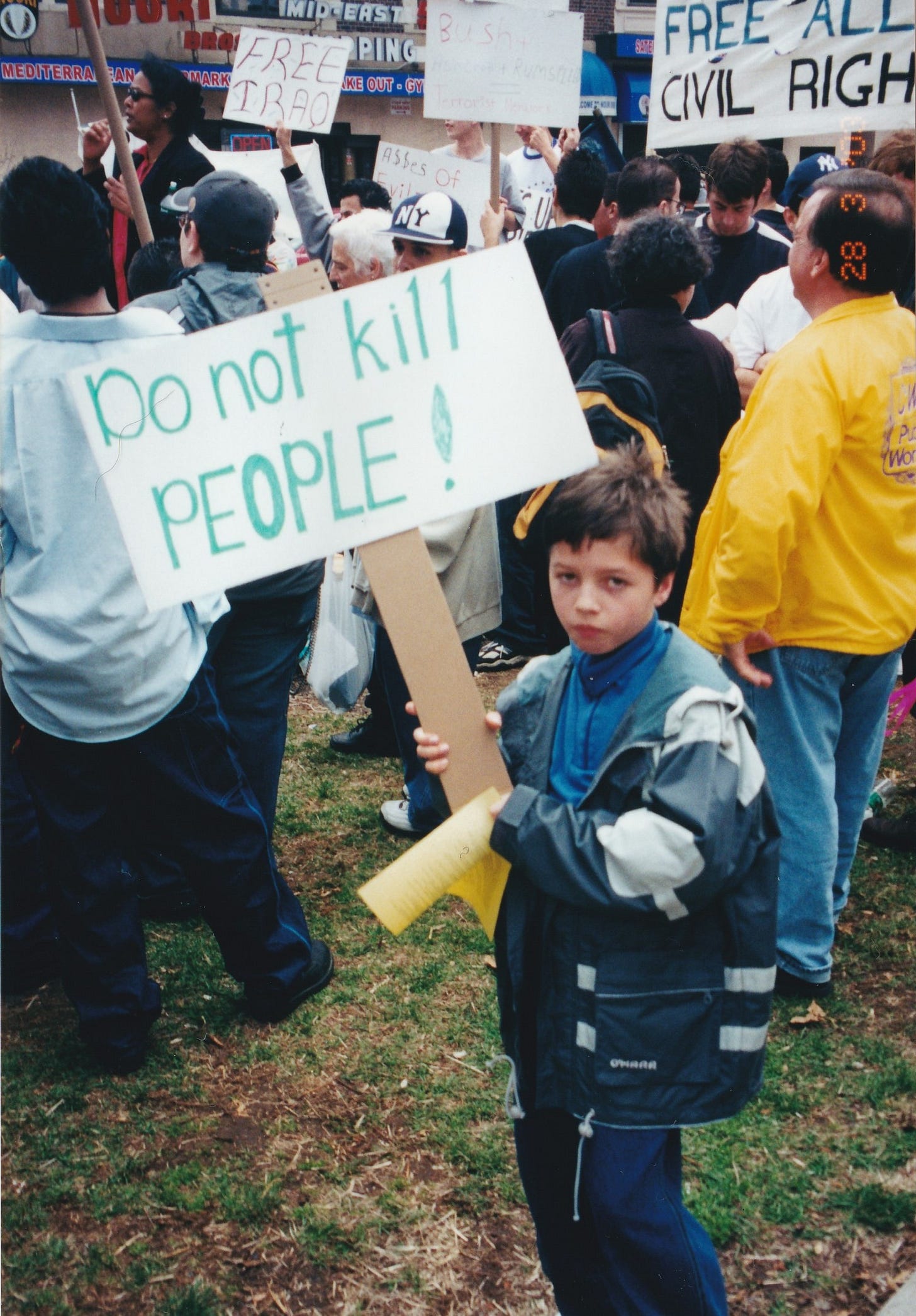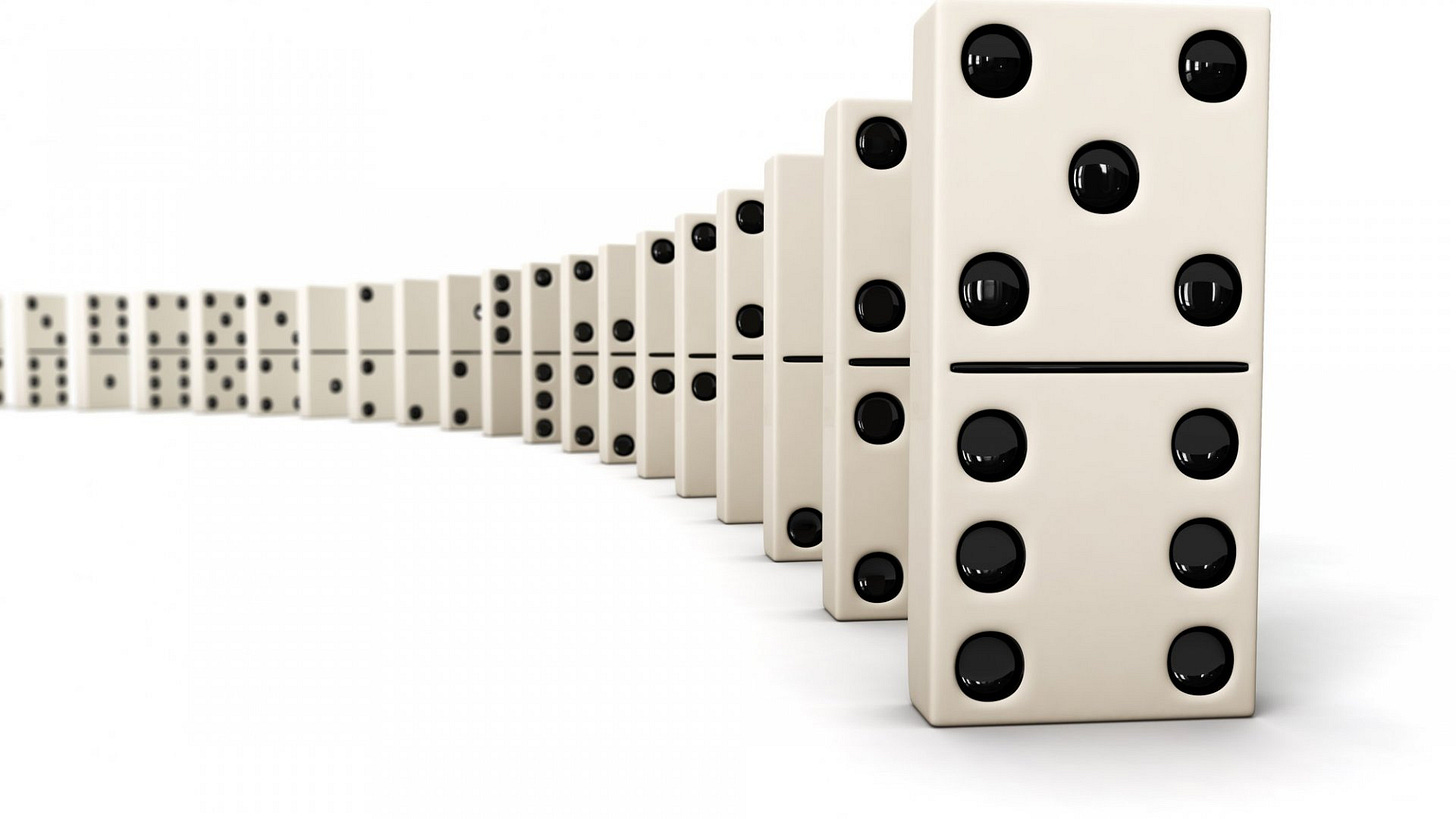#44: Super spreader effect of good ideas
How collaboration can save the human race from itself (and Moloch)
I believe that we can save the human race, one good idea at a time.
I call it, the super spreader effect of good ideas.
Let me start with where we are now:
Fu****
I’m only (partially) kidding, of course.
How are we fu****? Well, one part of the world is in the midst of a war. And the grim reality is that one part of the world is always in a war. Isn’t it just a matter of which war you choose to pay attention to? For example, not too long ago, when I was in middle school, everyone in America was paying attention to two other wars: the war in Iraq and the war in Afghanistan.
This morning, I read a prescient essay from Pavel S., a fellow Interintellect member. Pavel recounts attending an anti-war protest (Iraq) with his dad in New Jersey, in 2003.
Pavel included this photo of himself (which I hope he doesn’t mind me sharing here).
There is something deeply powerful and heartfelt about a little boy holding up a sign that says: “Do Not Kill People.”
If we teach our kids to not kill people, why do we still do it?
Honestly, I don’t know, but that’s not a compelling answer. And I have thought about it, so let me try to explain. Writing is, after all, about exploring the “I don’t knows” - just like science - which is what, in my opinion, makes science-fiction so compelling.
Okay, so back to the question: why do we kill people?
One explanation can be found in the famous poem Howl by Allen Ginsberg where Allen says, Moloch is to blame.
Moloch is a Biblical character: the God of child sacrifice. In the 18th century, a pastor, Johann Lund, envisioned him to look like this:
Moloch represents evil. He did many horrible things, including practicing child sacrifice. So if anyone is to blame for the world’s evil - yeah - Moloch is an A+ contender.
You may be wondering: what does Moloch, the Canaanite God of child sacrifice have to do with our wars today?
Great question.
Real talk: Allen Ginsberg was on a lot of drugs when he wrote the poem and I’m very grateful to Scott Alexander, a psychiatrist and, a legend, at least according to the weird and strange corner of the Internet that I inhabit, no really, there’s a NYT article about him, has done quite a successful job analyzing the poem.
There are many ways to interpret Scott’s essay (in this way, it is a work of art), and I resonate a lot with his interpretation. It is eerily reminiscent to one of my favorite books, Sapiens, by the historian Yuval Harari.
Scott’s psychoanalysis (of Allen’s poem, not Allen..) sheds light on what Moloch represents in modern society. We may no longer be sacrificing children or burning adults at the stake, but we are doing a whole bunch of other harmful things to one another, and dealing with the resulting side-effects.
Most people don’t even realize this. So if you’re nodding your head right now, give yourself a pat on the back. And if this is new information for you, welcome to the red-pilled.
Moloch can be represented through cultural references, i.e, Moloch is why “we can’t have nice things.” As soon as someone has a nice thing, someone else wants said nice thing. Arguably, however, wanting something that someone else has only becomes a problem if the wanted item is scarce.
Moloch turns in his grave when one person doesn’t play nice and that encourages other people to also not play nice. The example that Scott uses is a lake with fish farms owned by 1,000 competing companies. If one farmer decides to say screw it, no longer playing by the rules, and starting to over-fish (or over-pollute), more farmers will follow suit and break the rules, too. Without any forces at play, other than profits, and no external regulation, the lake will be over-fished and over-polluted.
Most importantly, well-meaning people will become “bad” people, harming themselves and others.
Whose to blame?
Well, Moloch, of course, a.k.a. the invisible systems that percolate through our collective conscience, exacerbated by the media and social media. The systems that put us at odds with one another and fuel toxic disagreements, on a local and global level.
Phew. That was a lot. So, will we ever be able to beat Moloch?
Honestly, I don’t know.
But, we should try. We can start by talking more, amongst one another, about the invisible forces at play. Moloch doesn’t like it when we talk about these forces, but screw Moloch (the God), he’s dead.
Ideas are contagious, like the flu. So let’s spread good ones.
With love, Rika. ❤️
Please tap the heart button below 👇🏾 to let me know that you liked this post.
Feel free to also leave a comment and share this post with one other person who you think would like it.







Thank you so much for reading and sharing my short essay, Rika, and for your thought-provoking insights. Yes, let's spread the good ones!
Talking more and spreading good thoughts and being positive certainly makes sense. And there are plenty of examples of seemingly small acts of kindness yielding amazingly broad positive results